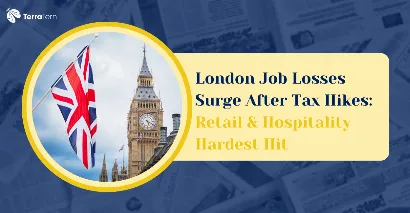Key Highlights
Capital people have witnessed a steep increase in job shedding, following a spate of taxation in the UK visa, curtailing the end of the year 2024 and 2025. Careful estimations show that nearly 45,000 payroll jobs have been lost in London since October. The capital city is the worst-affected area in the country. The principal causes? Increased employer national insurance (payroll tax), the introduction of a minimum wage and a lack of consumer spending. The retail and hospitality markets of London are hit hard, as well, and comprise a large proportion of lost employment.
Why Are London Job Losses the Highest?
Since the Labour government unveiled radical employment tax rises of some 26billion (35billion) last October, the businesses in London have found it very hard to keep their heads above water. Swelling compensation expenses and the low consumer demand imply that most firms, particularly those dealing with customers, will be unable to meet the expenses. The effect can be seen all over the city:
-
Nearly 45,000 were lost by October 2024 in London (a quarter of the national total).
-
The South East only added the percentage to nearly 4 out of 10 jobs lost throughout the country.
-
The retail and hospitality industries are worst hit; about one-third of the hospitality employment in the United Kingdom is in London.
Cost Challenges for Businesses
Kate Nicholls, CEO of UK Hospitality, explains: “The rent is higher, the business rates are higher, the wage costs are higher, and we are not seeing enough money coming through the front door. Businesses are struggling to remain viable.” In the past year alone, London lost about 30,000 hospitality roles.
Read More: UK Visitor Visa: Complete Application and Guidelines
Payroll Tax Hikes and Wage Increases: How They Hurt Employers?
Significant changes are to take effect starting April 2025:
-
The National Insurance covered by the employers was raised to 15% (was 13.8%).
-
The employer's National Insurance threshold was reduced to 5000 as opposed to 9100.
-
The National Living Wage increased by .77 (11.44 to 12.21).
-
As the Employment Allowance increased to 10,500 (small business friendly), smaller employers were adversely affected as costs incurred by bigger employers skyrocketed.
Job Losses by Region (Since October 2024)
See the estimated breakdown of job cuts across the UK:
|
Region |
Job Losses |
Share of National Total (%) |
|
London |
45,000 |
25 |
|
South East (excl. London) |
27,000 |
15 |
|
Rest of UK |
108,000 |
60 |
Also Read: A Complete Guide to UK Family Visa
Declining Job Vacancies
Vacancies in London dropped much faster than the national trend:
-
Retail and hospitality job ads fell almost 40% in London.
-
Across the rest of the UK, job ad declines were less steep: 26% for retail and only 9% for hospitality.
|
Location |
Retail Job Ad Decline |
Hospitality Job Ad Decline |
|
London |
40% |
40% |
|
UK Average |
26% |
9% |
Why Is London Hit Harder Than Rest of the UK?
London is feeling the impact of job losses more than any other UK region, and several key factors explain why.
-
London has higher base business costs: rent, wages, and business rates.
-
Most retail and hospitality jobs are concentrated in the city.
-
Tourism is yet to recover fully since the pandemic.
-
Consumers remain cautious with spending, due to weakening demand.
The Wider Impact
Across the UK, an estimated 180,000 jobs have been lost since October. Experts warn this may take the jobs market back to levels seen during the pandemic. Retailers like The Body Shop and Homebase have already closed their doors.
Also Read: Most Common Reasons For UK Visa Rejection Reason: Don’t Make These
Wages and Employment Conditions
Ages and employment conditions in London are changing, but not always for the better. While starting salaries have climbed across several sectors, these increases haven’t been enough to make up for cuts elsewhere.
-
Starting wages have increased in a variety of sectors to a degree that has not been able to counter cuts.
-
The number of zero-hours contracts is on the rise, and recently they constitute 1.9 per cent of all job adverts (an improvement in comparison to a year ago when they were 1.1 per cent).
-
Employers have changed the bargaining chips, providing fewer signing bonuses and less certain time.
Related Trends and Data
Here are the related trends and data regarding London tax hikes:
-
One hundred sixty-nine thousand three hundred ninety-five retail jobs were lost in the first half of 2025 (up 41.9% from the previous year).
-
The UK retail industry is down by over 93,000 jobs in 2025 compared to 2024, and 364,000 lower than a decade ago.
-
The sharpest employment drops occurred after the November budget announcement.
Read More: Great Opportunities with UK Work Visa for Indians
Conclusion
Increased taxes resulting in job losses in London point to the inherently compressing effects of elevated employer costs and impaired consumer demand on the urban economies. The focus of retail and hospitality puts it in the middle of most employment devastations across the country, with almost a quarter of the cases being in the capital city, an aspect that makes London more exposed to tax-oriented policy changes. Since the city is working on adapting, employers and policymakers will have to be attentive to the current trends. For the latest updates and official employment data, visit the UK government’s website. To learn more about the latest London or U.K. policy changes, visit TerraTern now!








